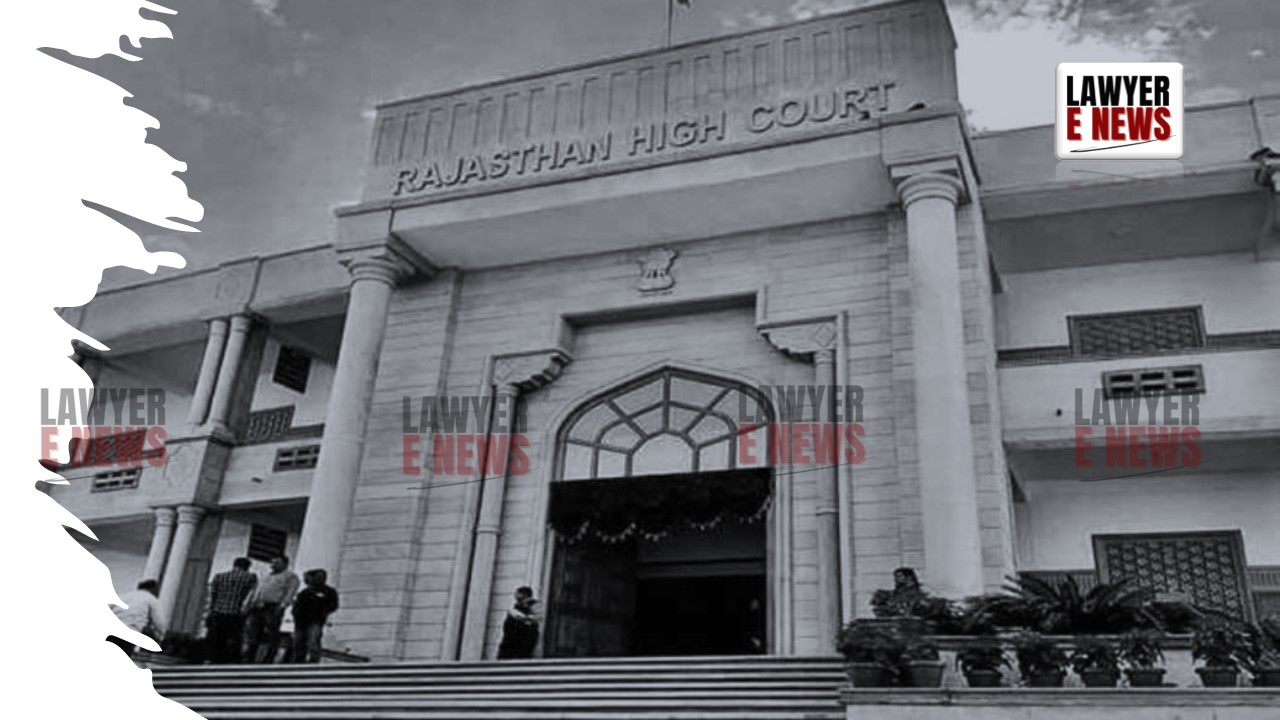-
by Admin
15 February 2026 2:16 AM



On September 12, 2024, the Rajasthan High Court at Jodhpur delivered a landmark judgment in the case of State of Rajasthan vs. Angrey Singh, overturning the trial court's acquittal of Angrey Singh and convicting him for the 1991 murder of his first wife, Choto. In a detailed ruling, the court emphasized that the trial court's omission to consider crucial eyewitness testimonies and forensic evidence was a patent error of law. The court sentenced the accused to life imprisonment under Section 302 IPC, setting a precedent on the importance of comprehensive evidence evaluation in criminal cases.
The incident occurred on June 20, 1991, when Angrey Singh allegedly murdered his first wife, Choto, by inflicting 56 blows with a Kassi. At the time, Singh was living separately from Choto due to marital discord and had established a separate residence with his second wife. The prosecution's case hinged on the testimonies of three eyewitnesses: Karnail Singh (PW.4), Choto's father; Rajvinder Kaur (PW.5), the couple's daughter; and Jangeer Singh (PW.6). Despite this evidence, the trial court acquitted Singh on October 28, 1992, leading the State of Rajasthan to appeal the decision.
The primary legal issue was whether the trial court erred in acquitting Singh by dismissing the testimonies of the three eyewitnesses and the forensic evidence linking the accused to the crime. The trial court had noted inconsistencies in the testimonies, particularly concerning the presence of PW.5 at the crime scene, and questioned the timing of the police report.
The High Court observed, "The learned Trial Court had omitted/misread the material evidence on record including the testimonies of three eyewitnesses of the incident in question, recovery of Kassi (weapon of crime), injuries caused to the deceased, medical report, as well as other evidence which were sufficient to convict and sentence the accused-respondent for the crime in question." It noted that the testimonies of the eyewitnesses, particularly PW.5, were consistent and detailed.
The High Court meticulously examined the eyewitness testimonies. PW.5, the daughter of the deceased, provided a detailed account of the murder, stating that the accused "took out the Kassi and started hitting the deceased and caused injuries to her body." PW.4 and PW.6 corroborated her testimony, stating that they witnessed the accused attacking Choto with the weapon. The court found their testimonies credible, observing that the minor contradictions noted by the trial court did not negate the consistency in their description of the attack.
The postmortem report played a pivotal role in the court's decision. It confirmed that Choto sustained eight injuries, with the head injury being fatal. PW.3, Dr. Devilal, who conducted the postmortem, testified that the injuries were consistent with being inflicted by a sharp-edged weapon, stating, "The injuries in question could have been caused by Kassi (weapon of crime in question)."
Forensic evidence further strengthened the prosecution's case. The Kassi recovered from the accused's residence had human blood matching the deceased's blood group. The court emphasized the importance of this evidence, noting, "The human blood as detected on the Kassi (weapon) was of the same blood group as found on the clothes last worn by the deceased."
The High Court criticized the trial court for disregarding crucial evidence and testimonies. It stated, "The learned Trial Court had clearly ignored the testimonies of the three eyewitnesses merely on count of some minor contradictions therein and also ignored the other corroborative evidence produced on record by the prosecution which is nothing but a patent error of law." The court stressed that the power of interference in an acquittal under Section 386 Cr.P.C. must be exercised when the judgment of acquittal suffers from patent perversity or is based on a misreading of material evidence.
Quoting the Supreme Court judgments in Mallappa & Ors. vs. State of Karnataka and Babu Sahebagouda Rudragoudar and Ors. vs. State of Karnataka, the court reiterated that, "If the view of the Trial Court is a legally plausible view, mere possibility of a contrary view shall not justify the reversal of acquittal." However, in this case, the court found the trial court's judgment legally implausible due to the omission of key evidence.
The Rajasthan High Court concluded that the acquittal of Angrey Singh was "not sustainable in the eye of law." It set aside the trial court's judgment and sentenced Singh to life imprisonment and a fine of ₹10,000, with an additional six months of rigorous imprisonment in case of default. The court ordered Singh, who was out on bail, to be taken into custody to serve his sentence.
Date of Decision: September 12, 2024
State of Rajasthan vs. Angrey Singh.
